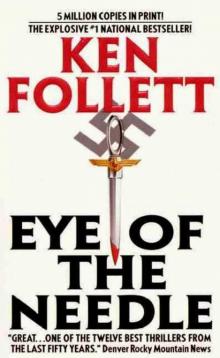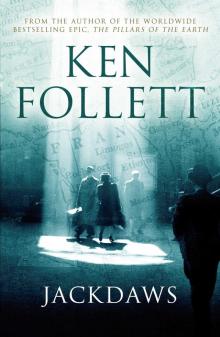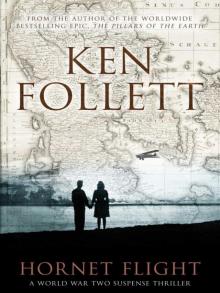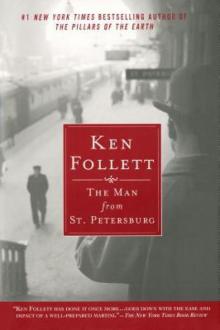- Home
- Ken Follett
Jackdaws Page 42
Jackdaws Read online
Page 42
CHAPTER 42
IT WAS SIX o'clock in the evening when Dieter parked outside the house in the rue du Bois.
His sky- blue car was covered with dust and dead insects after the long journey.
As he got out, the evening sun slipped behind a cloud, and the suburban street was thrown into shadow.
He shivered.
He took off his motoring goggles-he had been driving with the top down-and ran his fingers through his hair to flatten it.
"Wait for me here, please, Hans," he said.
He wanted to be alone with Stephanie.
Opening the gate and entering the front garden, he noticed that Mademoiselle Lemas's Simca Cinq was gone.
The garage door was open and the garage was empty.
Was Stephanie using the car? But where would she have gone? She should be waiting here for him, guarded by two Gestapo men.
He strode up the garden path and pulled the bell rope.
The ring of the bell died away, leaving the house strangely silent.
He looked through the window into the front parlor, but that room was always empty.
He rang again.
There was no response.
He bent down to look through the letter box, but he could not see much: part of the staircase, a painting of a Swiss mountain scene, and the door to the kitchen, half open.
There was no movement.
He glanced at the house next door and saw a face hastily withdraw from a window, and a curtain fall back into place.
He walked around the side of the house and through the courtyard to the rear garden.
Two windows were broken and the back door stood open.
Fear grew in his heart.
What had happened here? "Stephanie?" he called.
There was no answer.
He stepped into the kitchen.
At first he did not understand what he was looking at.
A bundle was tied to a kitchen chair with ordinary household string.
It looked like a woman's body with a disgusting mess on top.
After a moment, his police experience told him that the disgusting thing was a human head that had been shot.
Then he saw that the dead woman was wearing odd shoes, one black and one brown, and he understood she was Stephanie.
He let out a howl of anguish, covered his eyes with his hands, and sank slowly to his knees, sobbing.
After a minute, he dragged his hands from his eyes and forced himself to look again.
The detective in him noted the blood on the skirt of her dress and concluded that she had been shot from behind.
Perhaps that was merciful; she might not have suffered the terror of knowing she was about to die.
There had been two shots, he thought.
It was the large exit wounds that had made her lovely face look so dreadful, destroying her eyes and nose, leaving her sensual lips bloodstained but intact.
Had it not been for the shoes, he would not have known her.
His eyes filled with tears until she became a blur.
The sense of loss was like a wound.
He had never known a shock like this sudden knowledge that she was gone.
She would not throw him that proud glance again; she would no longer turn heads walking through restaurants; he would never again see her pull silk stockings over her perfect calves.
Her style and her wit, her fears and her desires, were all canceled, wiped out, ended.
He felt as if he had been shot, and had lost part of himself.
He whispered her name: at least he had that.
Then he heard a voice behind him.
He cried out, startled.
It came again: a wordless grunt, but human.
He leaped to his feet, turning around and wiping the moisture from his eyes.
For the first time he noticed two men on the floor.
Both wore uniforms.
They were Stephanie's Gestapo bodyguards.
They had failed to protect her, but at least they had given their lives trying.
Or one of them had.
One lay still, but the other was trying to speak.
He was a young chap, nineteen or twenty, with black hair and a small mustache.
His uniform cap lay on the linoleum floor beside his head.
Dieter stepped across the room and knelt beside him.
He noted exit wounds in the chest: the man had been shot from behind.
He was lying in a pool of blood.
His head jerked and his lips were moving.
Dieter put his ear to the man's mouth.
"Water," the man whispered.
He was bleeding to death.
They always asked for water near the end, Dieter knew-he had seen it in the desert.
He found a cup, filled it at the tap, and held it to the man's lips.
He drank it all, the water dribbling down his chin onto his blood-soaked tunic.
Dieter knew he should phone for a doctor, but he had to find out what had happened here.
If he delayed, the man might expire without telling what he knew.
Dieter hesitated only a moment over the decision.
The man was dispensable.
Dieter would question him first, then call the doctor.
"Who was it?" he said, and he bent his head again to hear the dying man's whispers.
"Four women," the man said hoarsely.
"The Jackdaws," Dieter said bitterly.
"Two at the front. . . two at the back. " Dieter nodded.
He could visualize the course of events.
Stephanie had gone to the front door to answer the knock.
The Gestapo men had stood ready, looking toward the hail.
The terrorists had sneaked up to the kitchen windows and shot them from behind.
And then. . .
"Who killed Stephanie?" "Water. . Dieter controlled his sense of urgency with an effort of will.
He went to the sink, refilled the cup, and put it to the man's mouth again.
Once again he drank it all, and sighed with relief, a sigh that turned into a dreadful groan.
"Who killed Stephanie?" Dieter repeated.
"The small one," said the Gestapo man.
"Flick," said Dieter, and his heart filled with a raging desire for revenge.
The man whispered: "I'm sorry, Major. . "How did it happen?"
"Quick. . . it was very quick. "
"Tell me. "
"They tied her up . . . said she was a traitor. . . gun to the back of the head. . . then they went away. "
"Traitor?" Dieter said.
The man nodded.
Dieter choked back a sob.
"She never shot anyone in the back of the head," he said in a grief-stricken whisper.
The Gestapo man did not hear him.
His lips were still and his breathing had stopped.
Dieter reached out with his right hand and closed the man's eyelids gently with his fingertips.
"Rest in peace," he said.
Then, keeping his back to the body of the woman he loved, he went to the phone.

 The Pillars of the Earth
The Pillars of the Earth Eye Of The Needle
Eye Of The Needle Lie Down With Lions
Lie Down With Lions Winter of the World
Winter of the World Triple
Triple World Without End
World Without End Fall of Giants
Fall of Giants Jackdaws
Jackdaws Hornet Flight
Hornet Flight Whiteout
Whiteout A Dangerous Fortune
A Dangerous Fortune The Man From St. Petersburg
The Man From St. Petersburg A Column of Fire
A Column of Fire The Hammer of Eden
The Hammer of Eden On Wings of Eagles
On Wings of Eagles The Evening and the Morning
The Evening and the Morning The Key to Rebecca
The Key to Rebecca Code to Zero
Code to Zero Paper Money
Paper Money A Place Called Freedom
A Place Called Freedom The Modigliani Scandal
The Modigliani Scandal Triple (1991)
Triple (1991) A Dangerous Fortune (1994)
A Dangerous Fortune (1994) A Place Called Freedom (1995)
A Place Called Freedom (1995) Winter of the World (Century Trilogy 2)
Winter of the World (Century Trilogy 2) Code to Zero (2000)
Code to Zero (2000) On Wings Of Eagles (1990)
On Wings Of Eagles (1990) Storm Island
Storm Island Fall of Giants (The Century Trilogy)
Fall of Giants (The Century Trilogy) the Third Twin (1996)
the Third Twin (1996) The Modigliani Scandal (1976)
The Modigliani Scandal (1976) Night Over Water
Night Over Water